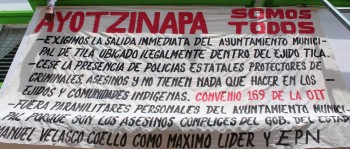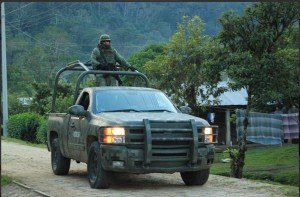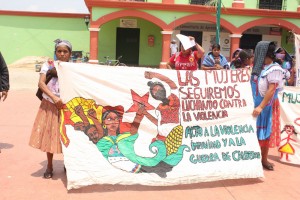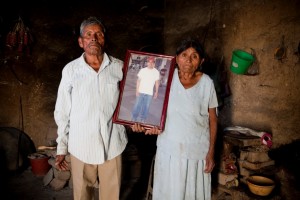Below is an interview with Victor Hugo López, Director of the Frayba Human Rights Center in Chiapas. It gives a good overview of the current situation the Indigenous Peoples are facing.
By: Nancy Flores
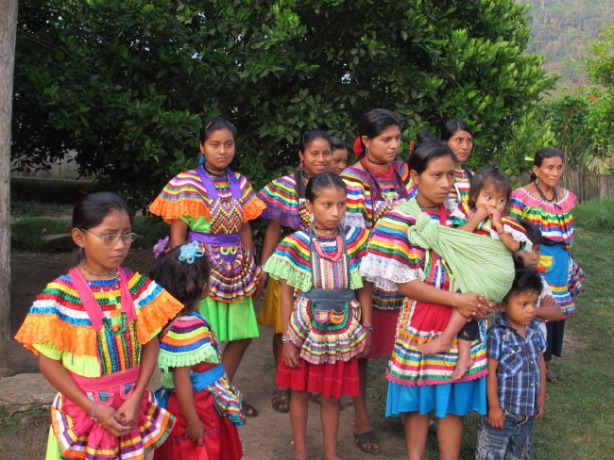
With the “war” against drug trafficking, Chiapas was once again militarized. Tensions among the EZLN, the bases of support, civil society in general and the government have increased together with the criminalization of peaceful protest. In an interview, Victor Hugo López –director of the Frayba Human Rights Center– points out that the militarization has also increased dispossession of the state’s natural, mineral and energy resources.
During the PAN government of Felipe Calderón Hinojosa, members of the Mexican Army and Navy occupied rural roads and indigenous communities of Chiapas little-by-little but overwhelmingly. Today, still with a pretext of drug trafficking, military personnel have zones under their control that had been liberated during the presidency of Vicente Fox Quesada as an example of the “governmental will” to pacify the region.
Thus, the maximum achievement of the “Calderón War” in that state of Southeast Mexico was not exterminating organized crime, but repositioning military personnel to the point that the current situation is comparable to that which it lived in two decades ago, when the Zapatista National Liberation Army (EZLN) rose up.
In an interview with Contralinea, the director of the Fray Bartolomé de las Casas Human Rights Center (Frayba), Victor Hugo López, explains that, although “spectacular scenes of violence” and confrontations in the streets have not been seen in Chiapas, the strategy of the “war” against drug trafficking did have serious repercussions in the communities. In principle, because it achieved a repositioning of the Mexican Army and Navy in different indigenous territories and at all the border points of the state, characterized by its misery and marginalization.
The young human rights defender remembers that one of the conditions that the Fox administration attended to in order to maintain dialogue with the EZLN was demilitarization: some of the most important military zones were eliminated, he says. Nevertheless, “this situation was lost with the Calderón strategy: while members of the Army patrol and put up checkpoints throughout the territory, members of the Navy take custody of the border points, including that of Guatemala.”
Currently, he exposes, members of the Mexican Army are present in different rural communities and roads in which they had not previously been seen. “They are making rounds again; they are even making operations of disarming. Sudden, they say, discreet [operations], but they are just touching the border or the line of fire here in Chiapas. This is serious, because it seems to me that they are not measuring the possibility of once again registering an [armed] confrontation.”
Victor Hugo López observes that the anti-drug strategy had other grave repercussions in Chiapas. One of these refers to the state security policy, because now the state police are at the command of the soldiers.
He also refers to the criminalization towards society as a whole. He gives as an example the operations of mixed units (military personnel accompanied by state and municipal police). These, he indicates, are the ones that have been committing the greatest number of arbitrary detentions of young people (men and women) in the streets simply for their appearance; they also commit abuses and torture.
In that same sense, the laws were hardened and forms of violence and mechanisms for human rights violations were legalized: “for example, although arraigo was eliminated in Chiapas and it was publicized as an achievement of the previous government, the Attorney General’s [security] houses, where people are disappeared, tortured and illegally detained, have increased.”
And despite the fact that the police-military operations as much as the legal modifications have been justified as a strategy against drug trafficking, the human rights defender observes that the sale and consumption of all kinds of drugs and alcohol are not regulated.
“In contradiction of the discourse of combatting drug trafficking g and organized crime, we have seen the exponential proliferation of cantinas where indiscriminate consumption of drugs and even human trafficking has been authorized and is even being promoted in different communities, because in some cases the owners are the mayors.”
Victor Hugo López warns that the conditions to maintain a state of insecurity are being created. An example of that is the alliance between the governments of Mexico, the United States and Guatemala: “the argument is that the organized crime and drug trafficking groups do not operate between Chiapas and Guatemala; but these policies have hardened the measures not against crime, but against the population.” Particularly, he points out, against the migrants.
To us, the protection of the border, the reinforcement of security and the combat against organized crime have meant greater social control and a greater index of repression against the population as a whole. And that has impacted in a way to appear invisible, but present. It is very present here in the cases that we receive every day of arbitrary detentions.
“In the Frayba we are receiving today an average of between 900 to 1000 cases in general; but 3 years ago we received from 400 to 500 cases. Now, of those 900 to 1,000 cases, some 400, in other words 40 percent, have to do with themes of criminalization, access to justice, arbitrary detention, arbitrary deprivation of life, torture and legalization. In our analysis, we see that they are effects of the strategy of the war against drug trafficking and organized crime: we could say that 40 percent of those cases are derived from that strategy.”
Megaprojects, the other threat
Despite the evidence Frayba gathered with respect to the increase in human rights violations, the federal and state governments assure that those rights are respected in Chiapas. Those discourses not only seek to conceal the situation the communities confront, but also to promote foreign investment in the region.
Victor Hugo López explains that: “the Mexican State has done an impressive lobbying job at the international level of being a guarantor, promoter and of respecting human rights in Mexico, and concretely in Chiapas, in the indigenous populations; for that it has ratified, signed and proposed all kinds of laws, regulations, conventions and protocols that can generate protection of that discourse. Mexico is a promoter of the Universal Declaration of the Rights of Indigenous Peoples and once again began saying that it had to legislate and approve the San Andrés Accords. In Chiapas we have local laws like the indigenous law, a law for the protection of woman, etcetera. Then they have created all the legal-judicial scaffolding to be able to maintain in front of world governments and foreign agencies that they are guarantying conditions of respect, promotion and protection of human rights and that, therefore, the levels of life, social security, tranquility and peace are guarantied in our state.”
He adds that recently 12 members of the European parliament have visited Chiapas wanting to know the human rights situation, but, above all, to ascertain the security conditions the zone offers for investment.
“What they are saying is that the Mexican government is impelling or re-impelling projects for investment, ecotourist projects, for the companies that extract minerals and petroleum resources, saying that in Chiapas it is all the scaffolding of respect and promotion of human rights that guarantee security in their in vestment.”
The director of the Fray Bartolomé de las Casas Human Rights Center says that a map is being identified of social conflict in the state provoked by the megaprojects of private investment. One of those conflicts, he details, is that of the Agua Azul zone,. In the area of the cascades, the campesinos are opposed to the governmental proposals for creating an ecotourist center.
“We see that the insult to the communities that defend their territories is being impelled again because they come in a decided manner to impel the projects that they have promised. And we have been able to corroborate it in this sense, because there is a security-investment-human rights conjoint that it is selling outside the country. They [foreign representatives] are coming to see if what they are selling is true. Then without a doubt it awaits us at this time and from her on once again processes of tension in which the communities will oppose those projects that come in a decided way to impose themselves.”
Within this context, Victor Hugo López warns that there is another actor in the territorial struggle: the National Crusade Against Hunger. This, he assures, has operated as a counterinsurgency mechanism: “the only thing that the Crusade seeks is to divide the communities, generate greater dependency and increase the conditions of extreme poverty in the state.”
Frayba: 125 years of Advocacy
On March 18, the Fray Bartolome de las Casas Human Rights Center turned 25 years old. Founded by the late Samuel Ruiz García – then Bishop of the Diocese of San Cristóbal de las Casas, Chiapas-, today is considered one of the most important Mexican organizations for the defence of the individual and collective rights.
With respect to these 2 and a half decades of work, its current director, Víctor Hugo López, reflects: “It has been 25 years of existence of the Center for human rights, but more than 500 years being influenced by indigenous peoples who have been insistent in generating proposals and alternatives to the crisis of the state and the system”.
The Frayba Center much appreciates that there are five autonomous regions, five good government juntas, which have the lowest rate of human rights violations. “They are people who have managed to cope with this system of structural violence and its consequences. “In this context is that we reach these 25 years: we recognize that the Frayba would not have had this success if it wasn’t thanks to the influence of these political actors and the subject that is the indigenous people”.
He adds that people who have known of the project and have collaborated on it are also fortunate in being in Chiapas territory. “Is a land where meaningful and highly visible contrasts arise: the undeniable wealth of energy, natural resources, but also the cultural wealth of policy proposal that we have been seeing born from the region, and that stems not only from 1994, but also from recognizing more than 500 years of history, with a major player which are the indigenous peoples.”
“We feel fortunate that our origin is essentially indigenous. The indigenous populations in Mexico are part of the population where violence and the violation of human rights come to impressive levels. In other words, if many mexicans are faced with the issues of corruption, discrimination and injustice, for indigenous peoples this type of violence is magnified, by their condition of being poor, indigenous people and peasants.
Víctor Hugo López mentions that violence in Chiapas has many fronts: Although the most visible is the image of the territory occupied by the military, there is territory occupied and cordoned off for “development” projects that are dividing communities.
However, he says, those conditions and those natural strains of the system are generating proposals and alternatives. Therefore, although for 15 years the state has been living what he calls a war against the population, there have been alternatives constructed mand of these autonomous, proposals of alternative justice models, reconstruction of the social fabric which, no doubt, can be guides in addressing the issues facing the current state of Mexico.
In Chiapas, there have been violent situations that subsequently reproduced their strategy or their effects at national level, such as the massacre of Acteal in 1997, which had a global impact: 45 people and four that were not born yet were massacred in a community. Today, the country has seen similar massacres that have occurred in different contexts and in various territories, including Michoacán, Tamaulipas and all states who are facing the strategy against organized crime.
At risk, 20 percent of the biodiversity of Mexico
Chiapas owns 20 percent of the biodiversity of Mexico and is the second nationally in biodiversity, this is accoriding to data from the state government, headed by Manuel Velasco Coello, the Green ecologist party of Mexico.
According to the official information, some of the most important natural resources are: 10 river basins and two of the largest rivers of the country: Grijalva and Usumacinta; 266 kilometers of coastline, two canyons; It has seven of the nine most representative ecosystems in the country and 46 protected areas (among these, Montes Azules biosphere, El Triunfo, La Encrucijada, La Sepultura, El Ocote and Lagunas de Montebello).
Currently, the local administration plans to exploit these resources through the “ecotourism” projects. Announcing that Chiapas will host the 2014 adventure tourism fair, this past May 12th is became known that the state administration is to “prepare a comprehensive plan of development of tourism in the region north and the jungle, having an axis starting at the city of Palenque and its archaeological zone. This plan will provide investment in infrastructure, signage, training and promotion, which will allow to consolidate tourist routes in the forest and other regions of the state.”
Four days later, the federal and state governments designated as “priority need” to carry out a formal territorial designation of the Selva Lacandona, Montes Azules biosphere reserve and protected natural areas:
“The government of the republic and of Chiapas expressed his conviction that territory is top priority to provide the necessary conditions for the full development of the Lacandona community and the adjacent towns to improve the quality of life of their inhabitants in accordance with the legal framework, favouring the consolidation of the protected natural areas and the sustainable development of these areas. Also, in accordance with the provisions of the general law of ecological balance and the protection of the environment, in its article 46, the letter says ‘in protected natural areas the foundation of new centers for populations will not be permitted’, you won’t be able to regularize the existing unauthorized settlements within the Montes Azules biosphere reserve, or any other protected area. Therefore no plan for compensation can be carried out since no resources will be allocated for those purposes.
————————————————————
Originally Published in Spanish by Contralinea
Translation: Chiapas Support Committee
June 17, 2014
En español:
http://contralinea.info/archivo-revista/index.php/2014/06/17/chiapas-militarizacion-saqueo-amenazan-indigenas/

